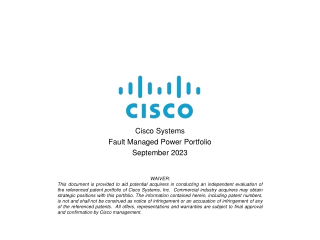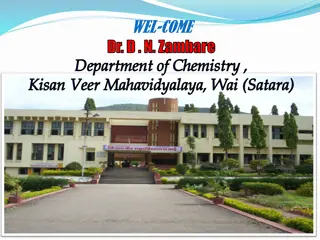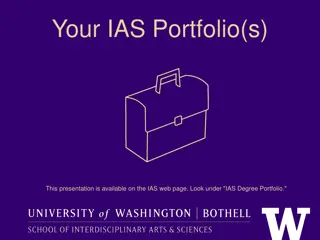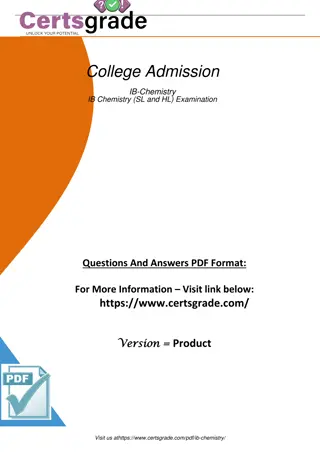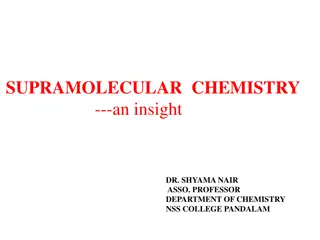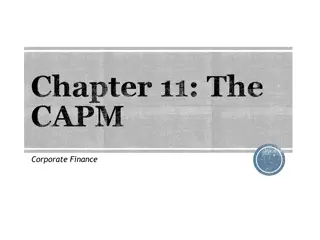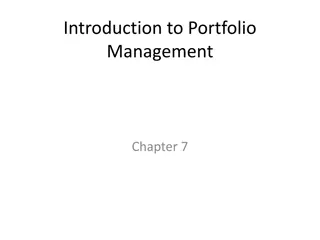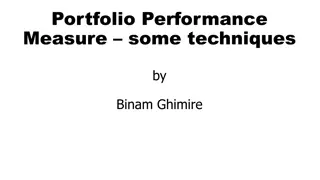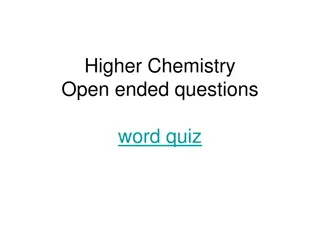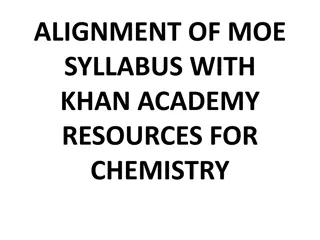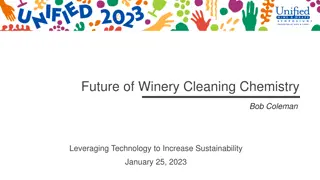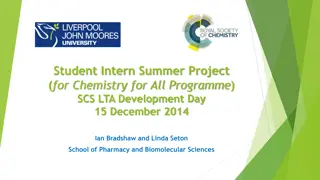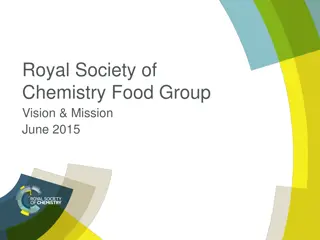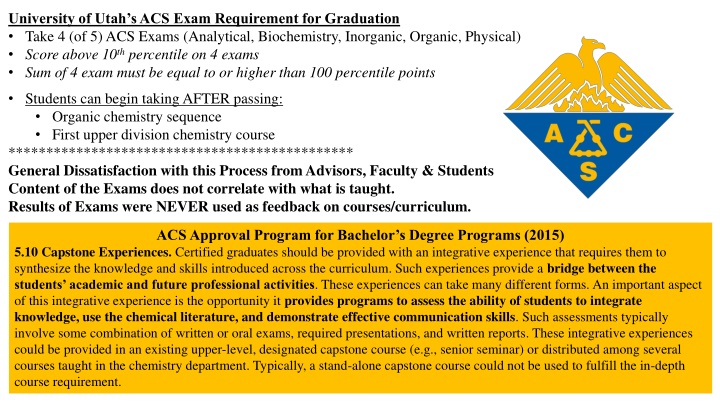
Innovative Assessment Methods in Chemistry Education at University of Utah
Explore a proposal to revolutionize student assessment in chemistry education at University of Utah. The current method of requiring students to take ACS exams is critiqued for its lack of alignment with curriculum and feedback incorporation. A portfolio system is proposed to empower students to document their learning, align curriculum with learning goals, and inform teaching practices. Discover a new approach to assessing student outcomes in chemistry education.
Uploaded on | 0 Views
Download Presentation

Please find below an Image/Link to download the presentation.
The content on the website is provided AS IS for your information and personal use only. It may not be sold, licensed, or shared on other websites without obtaining consent from the author. If you encounter any issues during the download, it is possible that the publisher has removed the file from their server.
You are allowed to download the files provided on this website for personal or commercial use, subject to the condition that they are used lawfully. All files are the property of their respective owners.
The content on the website is provided AS IS for your information and personal use only. It may not be sold, licensed, or shared on other websites without obtaining consent from the author.
E N D
Presentation Transcript
University of Utahs ACS Exam Requirement for Graduation Take 4 (of 5) ACS Exams (Analytical, Biochemistry, Inorganic, Organic, Physical) Score above 10th percentile on 4 exams Sum of 4 exam must be equal to or higher than 100 percentile points Students can begin taking AFTER passing: Organic chemistry sequence First upper division chemistry course ********************************************** General Dissatisfaction with this Process from Advisors, Faculty & Students Content of the Exams does not correlate with what is taught. Results of Exams were NEVER used as feedback on courses/curriculum. ACS Approval Program for Bachelor s Degree Programs (2015) 5.10 Capstone Experiences. Certified graduates should be provided with an integrative experience that requires them to synthesize the knowledge and skills introduced across the curriculum. Such experiences provide a bridge between the students academic and future professional activities. These experiences can take many different forms. An important aspect of this integrative experience is the opportunity it provides programs to assess the ability of students to integrate knowledge, use the chemical literature, and demonstrate effective communication skills. Such assessments typically involve some combination of written or oral exams, required presentations, and written reports. These integrative experiences could be provided in an existing upper-level, designated capstone course (e.g., senior seminar) or distributed among several courses taught in the chemistry department. Typically, a stand-alone capstone course could not be used to fulfill the in-depth course requirement.
Is there a better way to assess student outcomes ? Students will have a firm foundation in the fundamentals and application of current chemical and scientific theories including those in Analytical, Inorganic, Organic and Physical Chemistries. Majors to be certified by the American Chemical Society will have extensive laboratory work and knowledge of Biological Chemistry. Students will be able to design and carry out scientific experiments as well as accurately record and analyze the results of such experiments. Students will be skilled in problem solving, critical thinking and analytical reasoning as applied to scientific problems. Students will be able to clearly communicate the results of scientific work in oral, written and electronic formats to both scientists and the public at large. Students will be able to explore new areas of research in both chemistry and allied fields of science and technology. Students will appreciate the central role of chemistry in our society and use this as a basis for ethical behavior in issues facing chemists including an understanding of safe handling of chemicals, environmental issues and key issues facing our society in energy, health and medicine. Students will be able to explain why chemistry is an integral activity for addressing social, economic, and environmental problems. Students will be able to function as a member of an interdisciplinary problem solving team. Proposal: Employ a Portfolio System to Enable Students to Document their Learning throughout their Undergraduate Career. Goal: Engage Faculty to more explicitly align curriculum with learning goals and to review portfolios generated by students to inform teaching practices.
How Can We Help Students on Their Educational Journey Intro to U of U Courses Orientation intro to department CHEM 2000 Seminar 1st Year MAP Science Courses General Education Undergraduate Degree College Experiences Research/Internships Teaching/Stockroom Volunteering/Community Service Learning Abroad, Hinckley Leadership Future Career Connecting Major to Future Career Networking with professionals in field Resume/CV Prep/Interviewing Skills How have goals changed while in college?
Reflection tool in CHEM 2000 Who Are U?! Reflect on the path that you took to get to college at the University of Utah - this alone is a huge accomplishment. What events and milestones contribute to being here? Why did you decide to come to the U of U? Who will U be?! Think about what you want to achieve in your life; reflect on all areas of your life - academic, social, family, personal, health, etc. What are your goals for this semester? What about this academic year? Your time as an undergraduate? The next 10 years? Your lifetime? Challenges and Strategies: Now that you are half way through the semester, think back on some of the challenges you have dealt with transitioning into this semester and to the University of Utah (whether that was this semester or a few semesters ago). What challenges have you faced during college (academically, socially, financially, personally, etc)? What kind of strategies/resources do you use or do you want to use to help you grow and overcome these challenges? Why I Study Chemistry: Whether you were inspired by Breaking Bad, Bill Nye, or your awesome high school teacher, what drew you to study chemistry in college? What is your favorite part about it? How do you think you will use chemistry (as a topic and your degree) in your everyday life? Reflection of Fall 2018 and Goals for Spring 2019: Reflect back on your semester - what were your goals when you started the Fall 2018 semester? Consider your academic, personal (or non-academic), and social goals. How do you feel about your progress on those goals? Was there anything unexpected (positive or negative) that came up this semester that made an impact? What are your goals for Spring 2019 semester? What action steps do you plan to take to achieve them? Research Seminar Reflection: Summary + Reflection Examples from CHEM 2000 & Ivy Christofferson
Pathbrite as a Graduation Requirement Intro to U of U Courses Orientation intro to department CHEM 2000 Seminar 1st Year MAP Science Courses General Education Undergraduate Degree College Experiences Research/Internships Teaching/Stockroom Volunteering/Community Service Learning Abroad, Hinckley Leadership Future Career Connecting Major to Future Career Networking with professionals in field Resume/SV Prep How have goals changed while in college?
Prompts Chemistry Experience (Examples: Research, Internship, Literature Review, TA/LA, ACS) Non-Chemistry Experience (Examples: Hinckley Institute, Bennion Center, Learning Abroad, ASUU, Etc.) Connecting general education course to major Courses: NEED FACULTY HELP! CHEM 1210/1220 CHEM 2310/2320 CHEM 3000 CHEM 3060 CHEM 3070 CHEM 3100 2 Adv Labs Emphasis Course Application of major to topic of interest Informational Interview Resume/CV Reflection on Next Steps Exit Survey Anticipated Timeline: Experience Pathbrite in CHEM 2000 in their first year Get Added to Chemistry Major Canvas Course when they declare major Know their review/check-in faculty member Now can begin to answer prompts At the end of each semester, answer a new prompt (<30 min per prompt) Regular contact/communication with faculty has shown to SIGNIFICANTLY increase retention (Tinto, Astin)


